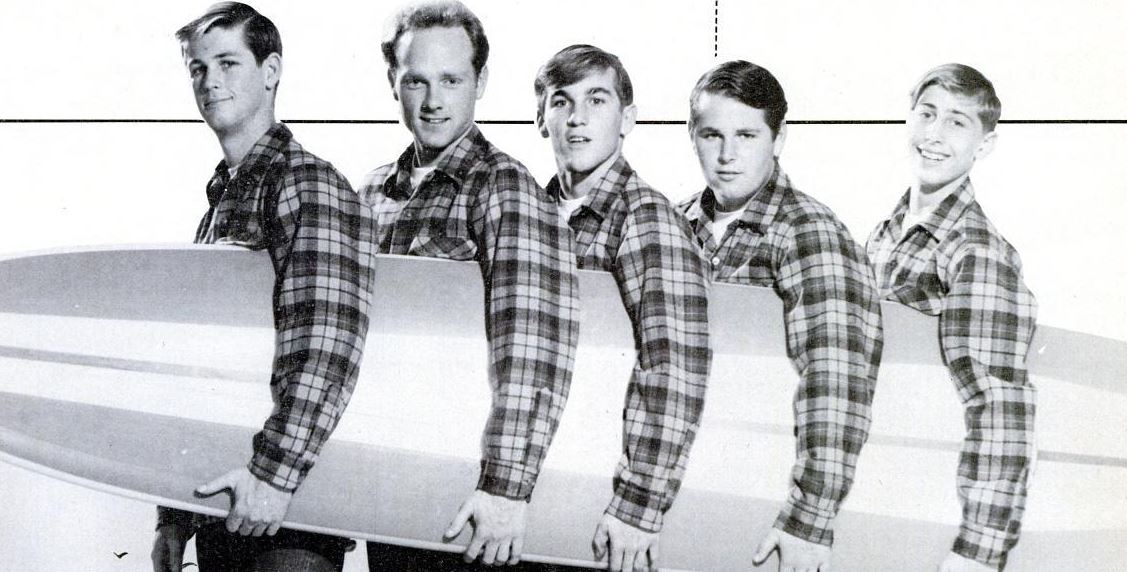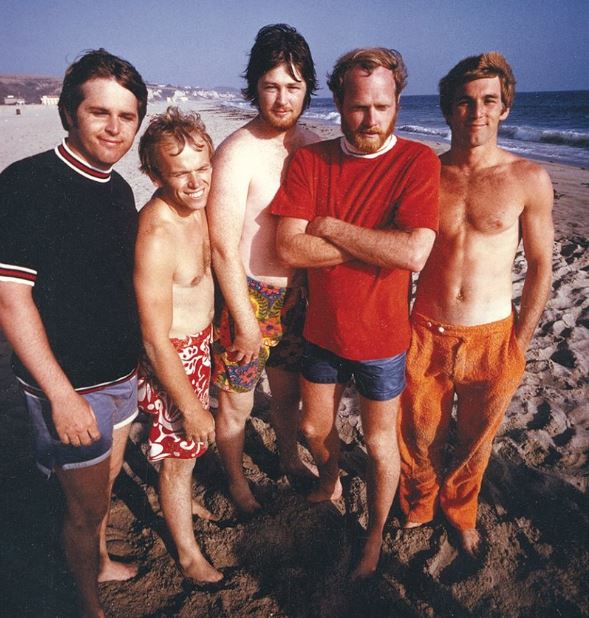Surfing was a recurring theme in many of The Beach Boys’ huge hit songs. The band was formed to write a song about surfing (get to know more interesting facts about surfing here!), an activity that has taken over California, particularly Southern California.
Mike Love and Brian Wilson were inspired to write and compose “Surfin’,” The Beach Boys’ first hit, by the sudden rise of the beach lifestyle and surf culture. And the rest, as they say, is history.
The SoCal-based surf music group quickly established as America’s answer to The Beatles, producing and delivering successful music records and hits. The Beach Boys contributed to the so-called California Sound by incorporating sophisticated vocal harmonies and simple yet fresh and direct lyrics that won millions of fans worldwide.
The original lineup, which included brothers Carl, Brian, and Dennis Wilson and their friend Al Jardine and cousin Mike Love, wrote a new chapter in surfing history. But, in addition to selling millions of records globally, The Beach Boys helped popularize surfing in and outside of the United States.
Take a gander at the most popular The Beach Boys songs that feature surfing in the title and lyrics, and enjoy the beach as you listen to each classic beach song.
Surfin’ (1962)
“Surfin’,” written by Mike Lov and Brian Wilson, was released as the Beach Boys’ debut single (with Luau on the B-side) on Candix Records in November 1961, and it made appearances on the 1962 album Surfin’ Safari.
The single effectively launched the Beach Boys’ music career, putting them at the forefront of what would later be known as the “California Sound.” The single reached number 75 in the United States but was never released in the United Kingdom. Later, for their 1992 album Summer in Paradise, the Beach Boys re-recorded the song.
Surfin’ Safari (1962)
It is now one of The Beach Boys’ most popular songs. However, when it was released in 1962, it only hit number 14 on the Billboard Hot 100. “Surfin’ Safari” appears to have done well in New York, even though surfing has never been a big sport in the city.
Surfin’ U.S.A. (1963)
Brian Wilson and Chuck Berry are credited with “Surfin’ U.S.A.” It’s a reworked edition of Berry’s “Sweet Little Sixteen,” with new lyrics written by Wilson and an unattributed Mike Love. The song was released digitally on March 4, 1963, along with “Shut Down,” and was later included as the first track on their eponymous album.
The single reached number two on the Music Vendor trade paper’s chart and three on the Cash Box and Billboard charts. It has since become synonymous with the California Sound. The song “Surfin’ U.S.A.” is included on The Rock and Roll Hall of Fame’s catalog of the 500 Songs That Shaped Rock and Roll.
Catch A Wave (1963)
This was a favorite of Brian Wilson’s. He claimed that the combination of guitar and piano sounds was more rhythmic. The guitars were cleaner and more driving as if they didn’t want to stop, and the piano he played was perfectly synced with the guitars. The three distinct sounds were combined to create a single, distinct sound.
Surfers Rule (1963)
In the 1960s, The Beach Boys and The Four Seasons were the only two American bands to achieve significant chart success. As a result, there was some competition between the two bands. The lyrics contest The Four Seasons to take the words of The Beach Boys seriously.
Surfer Girl (1963)
While The Beach Boys’ early hits demonstrated the boisterous rough’n’tumble of the surfing lifestyle, Brian Wilson didn’t take long to find a melancholy perspective to explore. “Surfer Girl” is a teenage fantasy; it swoons over the object of his devotion, imagining their future together before they’ve spoken a word to each other.
Wilson reportedly wrote the melody from beginning to end in his head in 1961 as a kind of test for himself – a remarkable accomplishment and the first prospering of his songwriting intuition.
South Bay Surfer (1963)
The song “South Bay Surfer” is a parody of The Honeys’ “Surfin’ Down the Swanee River.” According to the song, the lads are rough and prepared to overcome anything, and they’ll start taking the big one.
Surf’s Up (1971)
When Brian appeared on Inside Pop: The Rock Revolution, a 1967 US TV special hosted by Leonard Bernstein that sought to understand the growing sophistication of pop music, the song he performed was “Surf’s Up,” a song he’d written for SMiLE with Van Dyke Parks. Brian performed alone at the piano in the dim light, giving viewers a thrilling glimpse of a song bound for greatness.
The song stayed unreleased until it was picked up from the vaults and finessed to provide a title track and some major clout to the group’s 1971 album. The exquisite melody, by turns foreboding, haunting, serene, and – most of all – exquisitely fantastic and beautiful, with oblique lyrics that painted an image of luxury before suggesting a collapse of established order: an allegory for the seismic cultural changes of the 1960s, had played a major role in fanning the flames of the SMiLE myth.
“Surf’s Up” was so great that it exceeded expectations when it was finally assembled, embellished, and released.
Still Surfin’ (1992)
In 1992, the world had moved on from the hippie era, and surfing had also evolved. “Still Surfin'” was among the tracks on “Summer in Paradise,” Brian Wilson’s only album that included no new material. Surf magazines are mentioned in the lyrics.
A Group of Non-Surfers
The most well-known surf band released 11 songs with the words “waves” or “surfing” in the title. Many other songs make references to surfer girls, surfers, and popular wave riding stunts.
Interestingly, everybody in the band adored cars, and Dennis Wilson was The Beach Boys’ only surfer. Dennis, ironically, died after drowning in Marina Del Rey.
Mike Love collaborated on a few surf-related lyrics. However, when the waves were the core idea of their sun-kissed tunes, it’s almost always Brian Wilson who wrote – or co-wrote – almost all surf-related songs.
They used surf slang and jargon and classic surfer catchphrases, and they quickly gained popularity among the SoCal surfer community.
For nearly six decades, The Beach Boys’ music was an invaluable part of American history. Their brilliant harmonies communicated simple truths in avant-garde, sophisticated musical arrangements. They transcended their music to become symbols of Californian culture, providing fans worldwide with a passport to discover youthful vitality, love, and surf culture.


